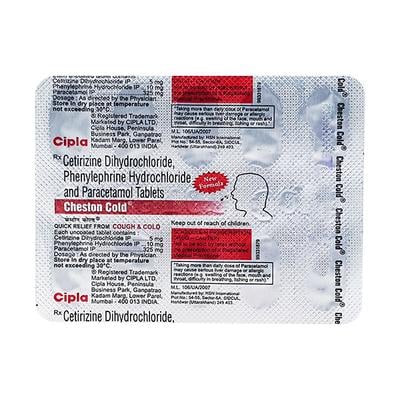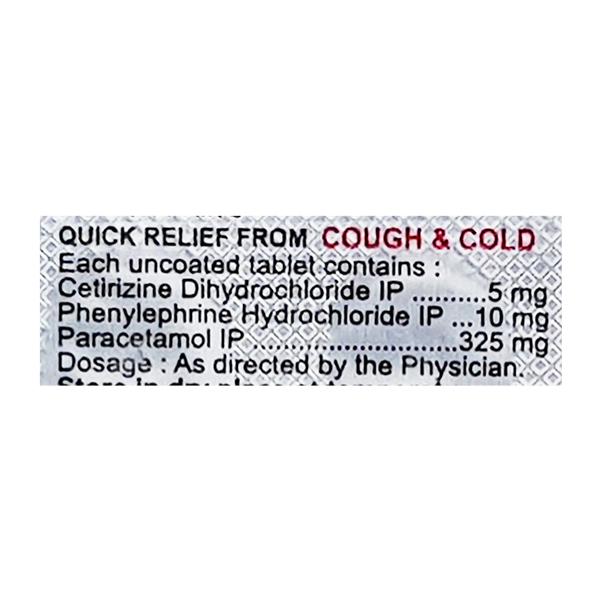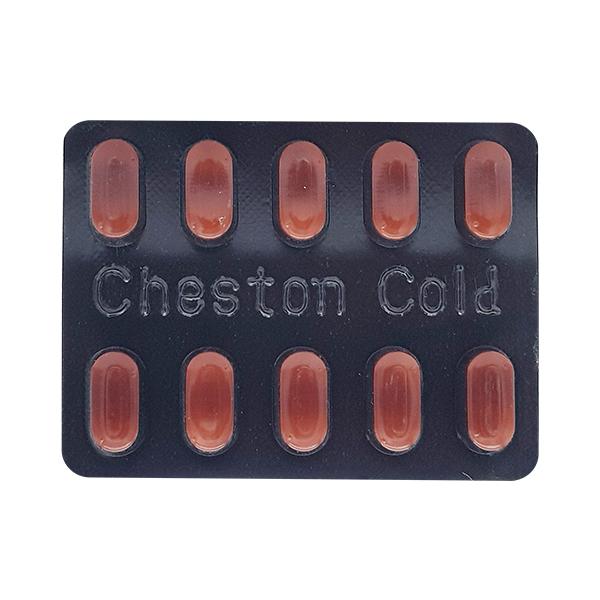

Netmeds First Membership
Quick Links
Introduction About CHESTON COLD TABLET
CHESTON COLD TABLET is a combination of Cetirizine, Paracetamol, and Phenylephrine, which belong to the group of medicines called Antihistamines, Analgesic and Antipyretics, and Nasal Decongestants, respectively. CHESTON COLD TABLET is used to relieve symptoms of common cold, such as a blocked nose, runny nose, watery eyes, sneezing, congestion or stuffiness, fever, and headache. It reduces congestion and helps with easy breathing.
Avoid alcohol consumption while taking CHESTON COLD TABLET as it leads to excessive drowsiness. CHESTON COLD TABLET is not recommended for use in patients with severe hypertension, coronary artery disease, or liver dysfunction. CHESTON COLD TABLET should be used with caution in patients with occlusive vascular disease, including Raynaud’s phenomenon, liver problems, and kidney problems.
CHESTON COLD TABLET should be used with caution in pregnant women, and it is not recommended for use in breastfeeding women. CHESTON COLD TABLET is not recommended for use in children and adolescents below 12 years of age. Consult your doctor before taking the medicine. The most common side effects of CHESTON COLD TABLET are nausea, vomiting, fatigue, dry mouth, headache, abdominal pain, drowsiness, and dizziness. Consult your doctor for advice if any of the above side effects worsen or persist for a longer duration.
Uses Of CHESTON COLD TABLET
It is used to relieve:
- blocked, runny nose
- watery eyes
- sneezing
- congestion, stuffiness
- fever
- headache
How CHESTON COLD TABLET Works
CHESTON COLD TABLET is a combination of Cetirizine, Paracetamol, and Phenylephrine. Cetirizine is an H1 receptor antagonist that works by blocking the action of a chemical messenger (histamine) responsible for runny noses, watery eyes, and sneezing. Paracetamol is an analgesic and antipyretic that acts by inhibiting the synthesis of prostaglandins (chemicals that cause inflammation, pain, and fever), which helps in reducing pain and fever. Phenylephrine is a nasal decongestant that acts by narrowing the small blood vessels, providing temporary relief from congestion or stuffiness in the nose.
How to use CHESTON COLD TABLET
Take CHESTON COLD TABLET as advised by your physician. Swallow the medicine with a glass of water. Do not crush or chew this medicine. The dose and duration for you will be decided by your physician depending on your age, body weight, and disease condition.
Side Effects Of CHESTON COLD TABLET
Common
- nausea
- vomiting
- fatigue
- dry mouth
- headache
- abdominal pain
- drowsiness
- dizziness
- diarrhoea
Stop taking CHESTON COLD TABLET and contact your physician immediately if you experience the following side effects:
- allergic reactions (symptoms include erythema, rash, pruritus, urticaria, dyspnoea)
How To Manage Side Effects
Diarrhea
Drink lots of fluids, such as water or fruit juice to keep yourself hydrated. Do not consume any medicine on your own without consulting your doctor.
Dizziness Or Drowsiness
Try to rest and relax. Get enough sleep. Avoid driving or operating any tools or machines while you are feeling drowsy. Do not drink alcohol, as it can worsen your drowsiness. Consult your doctor if the symptom did not improve.
Nausea And Vomiting
Drink clear or ice-cold drinks. Eat light, bland foods. Avoid fried, greasy, or sweet foods. Eat slowly and smaller and more frequent meals, drink gradually larger amounts of clear liquids, avoid solid food until the vomiting episode has passed, and take rest. If the symptom does not improve, contact your doctor.
Stomach Pain
Try to rest and relax. Eat and drink slowly or try to have smaller and more frequent meals. Keep a heating pad on your stomach. If the symptom does not improve, contact your doctor.
Warning & Precautions
Pregnancy
Monitoring requiredCHESTON COLD TABLET should be used in pregnancy only if the potential benefit justifies the potential risk to the fetus. Consult your doctor before taking it.
Breastfeeding
ContraindicatedCHESTON COLD TABLET is not recommended for use in breastfeeding women. Consult your doctor before taking it.
Driving and Using Machines
Use with CautionDo not drive or operate any machines if you feel sleepy or drowsy after taking CHESTON COLD TABLET.
Alcohol
Consult your doctorAvoid alcohol consumption while using CHESTON COLD TABLET as it leads to excessive drowsiness.
Kidney
Use with CautionCHESTON COLD TABLET should be used with caution in patients with kidney problems. Consult your doctor before taking it.
Liver
Consult your doctorCHESTON COLD TABLET is not recommended in patients with severe hepatic dysfunction. It should be used with caution in patients with mild to moderate liver problems. Consult your doctor before taking it.
Allergy
ContraindicatedDo not take CHESTON COLD TABLET if you are allergic to Cetirizine, Paracetamol, and Phenylephrine, or to any other ingredients of this medicine.
Heart Disease
ContraindicatedCHESTON COLD TABLET is not recommended to use in patients with coronary artery disease and severe hypertension. Consult your doctor before taking it.
Use In Pediatrics
ContraindicatedCHESTON COLD TABLET is not recommended for use in children and adolescents below 12 years of age. Consult your healthcare professionals before giving it to your child.
Use In Geriatrics
Use with CautionCHESTON COLD TABLET should be used with caution in elderly patients. Consult your doctor before taking.
Others
Before taking CHESTON COLD TABLET, inform your doctor if you have:
- occlusive vascular disease (Raynaud’s phenomenon)
Interactions
A. Drug-Drug interactions:
Before taking CHESTON COLD TABLET, inform your doctor if you are taking any of the following medicines:
- medicines used to manage depression (Ex. isocarboxazid, phenelzine)
- medicines used for colds, coughs, sleeping, or pain (Ex. chlorpheniramine, diazepam, opioids)
- medicines used to manage epilepsy (Ex. phenobarbital, phenytoin, sodium valproate, primidone, carbamazepine)
- medicines used to manage HIV infections (Ex. zidovudine)
- warfarin (medicine used to manage blood clotting)
- medicines used to manage nausea and vomiting (Ex. domperidone, metoclopramide)
Overdosage:
If you or anyone else accidentally takes too much of CHESTON COLD TABLET, consult your doctor immediately or visit the nearby hospital. Symptoms of overdosage are restlessness, irritability, palpitations, hypertension, difficulty in micturition, nausea, vomiting, thirst, convulsions, and liver damage.
Synopsis
| Drug | : | Cetirizine, Paracetamol, Phenylephrine |
| Pharmacological Category | : | Anti-allergic, Analgesic, Antipyretic, Nasal Decongestants |
| Therapeutic Indication | : | Relieves common cold symptoms |
| Dosage Forms | : | Tablet, Syrup, Suspension, Drops |
More Information
- Keep CHESTON COLD TABLET out of sight and reach of children
- Store CHESTON COLD TABLET at room temperature
FAQs About CHESTON COLD TABLET
Q: What is CHESTON COLD TABLET used for?
A: CHESTON COLD TABLET is used to relieve symptoms of common cold, such as a blocked nose, runny nose, watery eyes, sneezing, congestion or stuffiness, fever, and headache. It reduces congestion and helps with easy breathing.
Q: Does CHESTON COLD TABLET cause drowsiness?
A: Yes, the most common side effect of CHESTON COLD TABLET is drowsiness. Caution should be exercised while driving or operating heavy machines. Do not drive or handle heavy machines if you experience side effects like dizziness or drowsiness while taking CHESTON COLD TABLET. Consult your healthcare professional if the symptom does not improve.
Q: Can I consume alcohol along with CHESTON COLD TABLET?
A: No, it is not advisable to drink alcohol while taking CHESTON COLD TABLET. Consuming alcohol along with CHESTON COLD TABLET may aggravate the symptoms of CHESTON COLD TABLET and cause severe liver damage, dizziness, and drowsiness. Consult your doctor before using it.
Q: Can we use CHESTON COLD TABLET during pregnancy and breastfeeding?
A: CHESTON COLD TABLET should be used with caution in pregnant women, and it is not recommended for use in breastfeeding women. Consult your doctor before using it.
Q: Is CHESTON COLD TABLET an antibiotic?
A: No, CHESTON COLD TABLET is not an antibiotic. CHESTON COLD TABLET is a combination of cetirizine, paracetamol, and phenylephrine, which belong to the group of medicines called anti-allergic, analgesic, antipyretic, and decongestant, respectively. It is used to relieve symptoms of the common cold, such as a blocked nose, runny nose, fever, headache, watery eyes and sneezing, allergic rhinitis, and nasal congestion. It does not manage bacterial infections.
Q: What precautions are to be taken if I forget to take CHESTON COLD TABLET?
A: Before taking CHESTON COLD TABLET, inform your doctor if you have diabetes, thyroid problems, fits, orocclusive vascular disease (Raynaud’s phenomenon).
Q: What should I do if I forget to take a dose of CHESTON COLD TABLET?
A: If you forget to take a dose of CHESTON COLD TABLET, take it as soon as you remember. However, if it is time for the next scheduled dose, skip the missed dose and take the usual prescribed dose. Do not take a double dose for the missed dose.
Q: Can I stop taking CHESTON COLD TABLET if I feel better?
A: Do not stop taking CHESTON COLD TABLET, even though you feel better. Your symptoms may reoccur if you stop taking CHESTON COLD TABLET. Inform your doctor before stopping it.
Q: Can CHESTON COLD TABLET cause diarrhea?
A: Yes, CHESTON COLD TABLET can cause diarrhea in some individuals. Drink lots of fluids, such as water or fruit juice, to keep yourself hydrated. Do not consume any medicine on your own without consulting your doctor.
Q: Can I take CHESTON COLD TABLET during kidney disease?
A: CHESTON COLD TABLET should be used with caution in patients with kidney problems. Consult your doctor before taking it.
Q: Can I take CHESTON COLD TABLET during liver disease?
A: CHESTON COLD TABLET is not recommended in patients with severe hepatic dysfunction. It should be used with caution in patients with mild to moderate liver problems. Consult your doctor before taking it.
Q: What are the side effects of taking CHESTON COLD TABLET?
A: The most common side effects of taking CHESTON COLD TABLET are nausea, vomiting, fatigue, dry mouth, headache, abdominal pain, drowsiness, dizziness, and diarrhea. Consult your doctor if any of the side effects worsen.
Q: Who should not take CHESTON COLD TABLET?
A: CHESTON COLD TABLET is not recommended for use if you have severe liver disease, are allergic to cetirizine, paracetamol, and phenylephrine, or have coronary artery disease and severe hypertension. Consult your doctor before taking it.
Q: How does CHESTON COLD TABLET work?
A: CHESTON COLD TABLET is a combination of Cetirizine, Paracetamol, and Phenylephrine, where Cetirizine is an H1 receptor antagonist that works by blocking the action of a chemical messenger (histamine) responsible for runny noses, watery eyes, and sneezing. Paracetamol is an analgesic and antipyretic that acts by inhibiting the synthesis of prostaglandins (chemicals that cause inflammation, pain, and fever), which helps in reducing pain and fever. Phenylephrine is a nasal decongestant that acts by narrowing the small blood vessels, providing temporary relief from congestion or stuffiness in the nose.
Q: Can I get a CHESTON COLD TABLET delivered to my doorstep by purchasing from Netmeds?
A: Yes, most online pharmacy platforms like Netmeds in India offer doorstep delivery services for CHESTON COLD TABLET. If you wish to buy a CHESTON COLD TABLET on Netmeds, you need a prescription from a registered medical practitioner. You can place your order online, provide your address details, and the medication will be delivered to your specified location within the designated time frame. Netmeds has made buying online medicines more easy for consumers and is one of India's leading online pharmacies.
References
1. KD. Tripathi Autacoids and Related Drugs, Adrenergic System and Drugs, Nonsteroidal Anti-inflammatory Drugs and Antipyretic-Analgesics Essentials of medical pharmacology. Seventh edition. 2013. page no -166, 135, 192.
2. Aasim Naqvi; Valerie Gerriets. Cetirizine. NIH. National Library of Medicine. National Center for Biotechnology Information. StatPearls. November 2022. [Accessed on 15th March 2024] https://www.ncbi.nlm.nih.gov/books/NBK549776/
3. Samir S Ayoub. Paracetamol (acetaminophen): A familiar drug with an unexplained mechanism of action. The Journal of Temperature. February 2021. [Accessed on 15th March 2024] https://www.tandfonline.com/doi/full/10.1080/23328940.2021.1886392
4. Evan Richards; Michael J. Lopez; Christopher V. Maani. Phenylephrine. NIH. National Library of Medicine. National Center for Biotechnology Information. StatPearls. July 2022. [Accessed on 15th March 2024] https://www.ncbi.nlm.nih.gov/books/NBK534801/
5. Phenylephrine. NIH. National Library of Medicine. [Accessed on 15th March 2024] https://medlineplus.gov/druginfo/meds/a606008.html
6. Cetirizine, Paracetamol, and Phenylephrine. Tajlifeceiences. [Accessed on 15th March 2024] https://tajlifesciences.com/
7. Cetirizine, Paracetamol, and Phenylephrine. Ikon remedies. [Accessed on 15th March 2024] https://www.ikonremedies.com/product/rhinorest-cold-tablets/
8. Cetirizine, Paracetamol, and Phenylephrine. www.leeford.in. [Accessed on 15th March 2024] https://www.leeford.in/product/617/coldfiz










